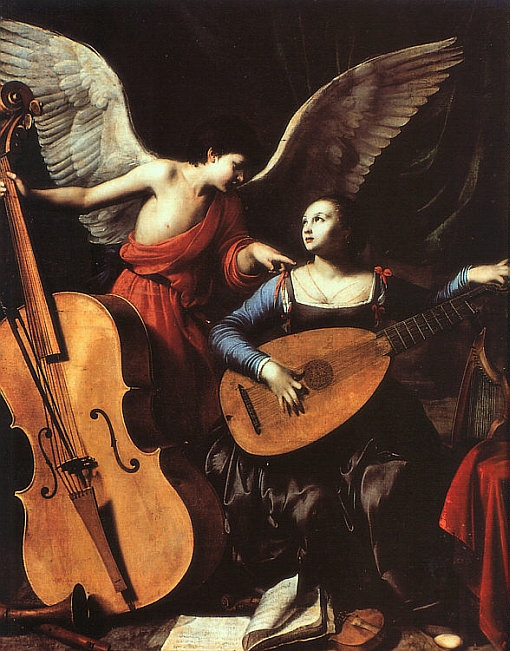
From harmony, from heavenly harmony,
This universal frame began:
When nature underneath a heap
Of jarring atoms lay,
And could not heave her head,
The tuneful voice was heard from high,
‘Arise, ye more than dead!’
Then cold, and hot, and moist, and dry,
In order to their stations leap,
And Music’s power obey.
From harmony, from heavenly harmony,
This universal frame began:
From harmony to harmony
Through all the compass of the notes it ran,
The diapason closing full in Man.
What passion cannot Music raise and quell?
When Jubal struck the chorded shell,
His listening brethren stood around,
And, wondering, on their faces fell
To worship that celestial sound:
Less than a God they thought there could not dwell
Within the hollow of that shell,
That spoke so sweetly, and so well.
What passion cannot Music raise and quell?
The trumpet’s loud clangour
Excites us to arms,
With shrill notes of anger,
And mortal alarms.
The double double double beat
Of the thundering drum
Cries Hark! the foes come;
Charge, charge, ’tis too late to retreat!
The soft complaining flute,
In dying notes, discovers
The woes of hopeless lovers,
Whose dirge is whisper’d by the warbling lute.
Sharp violins proclaim
Their jealous pangs and desperation,
Fury, frantic indignation,
Depth of pains, and height of passion,
For the fair, disdainful dame.
But O, what art can teach,
What human voice can reach,
The sacred organ’s praise?
Notes inspiring holy love,
Notes that wing their heavenly ways
To mend the choirs above.
Orpheus could lead the savage race;
And trees unrooted left their place,
Sequacious of the lyre;
But bright Cecilia rais’d the wonder higher:
When to her organ vocal breath was given,
An angel heard, and straight appear’d
Mistaking Earth for Heaven.
Grand Chorus.
As from the power of sacred lays
The spheres began to move,
And sung the great Creator’s praise
To all the Blest above;
So when the last and dreadful hour
This crumbling pageant shall devour,
The trumpet shall be heard on high,
The dead shall live, the living die,
And Music shall untune the sky!
—John Dryden, A Song for St Cecilia’s Day, 1687 in: The Poems of John Dryden vol. 2, pp. 538-39 (J. Kinsley ed. 1958)
—George Frederick Handel, An Ode for St Cecilia’s Day HWV 76 (1739)
As yesterday was Thanksgiving, I let another important date go by. Thanksgiving was celebrated as early as ever it can be this year, so it fell on November 22, which would more properly be observed as St Cecilia’s Day. In England’s Augustan Age, the celebration of St Cecilia’s Day was an important event, though not for its religious significance (St Cecilia was a minor saint, after all) so much as for philosophy, music and the arts. There are a great number of odes, poems and airs and the tradition continued to W.H. Auden, whose Hymn to St Cecilia is beautiful. But I commend the greatest of these: John Dryden’s Song.
Dryden’s work is a celebration of Pythagoras and his theory. Of course the Pythagorean theory can be called a theory of music, but that rather misses the point. It is a theory of mathematics, the mathematical expression of relationships and music as a means of noting all of this. And Pythagoras of course also believed that as the music of the spheres drove the universe, so it also touched and affected humankind. Pythagoras’s idea of celestial harmony is thus literal in the common sense of harmony, and something else again. As Aristotle said in his discussion of Pythagoras in the Metaphysica
since. . . they [Pythagoras and his followers] saw that the modifications and the ratios of the musical scales were expressible in numbers;—since, then, all other things
seemed in their whole nature to be modelled in numbers, and numbers seemed to be the first things in the whole of nature, they supposed the elements of numbers to be the elements of all things, and the whole heaven to be a scale and a number. . .
These are the tools Dryden is playing with. His St Cecilia is about music, as ordinarily understood. But it is also about music as an emotive force, and then as a cosmic force—something which man only barely understands. Thus it is about music as an eternal mystery which science and art may conjointly unfold.
In this manner, as is his way, Dryden gives us the bridge. Antiquity reaches towards the modern thinking of Enlightenment, and a Christian saint who has been transformed into something amazingly unlike her early Christian image hovers over it. The poem itself is, by the way, packed with Pythagorean tricks which work their way into numbers (consider the number ten, of great importance to the Pythagoreans, which works its way through the poem—start by counting the number of instruments mentioned, for instance) and meter.
Read Dryden’s poem, but the better exercise, the way in fact it was intended to be heard, is not by recitation but by intonation. And the grandest setting of this poem, the only one which is every bit the equal of the text, is Handel’s composition from 1739. A number of good performances out there worthy of a listen, but this one by the King’s Consort with Carolyn Sampson is really splendid.


